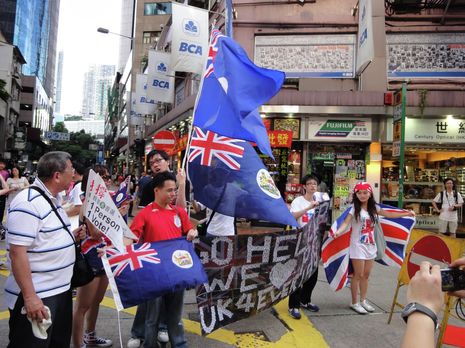Divided loyalties: aligning my political identity
Issac Fung elucidates the entanglements of his dual sense of belonging in British politics

“Yes, him! I want Corbyn to win, because then the British economy will crash.”
This, in any other context, would be sarcasm. But my mother, who was lecturing me about the British General Election, was dead serious.
“The party with the red colour – what is it called again? They don’t know how to run the economy properly. So, when pound sterling drops in value, we can buy more. Better value for money. Ai, we spend too much on your tuition fees anyway.”
“Real global awareness does not come from a detached, rarefied and ‘cosmopolitan’ air.”
Needless to say, I did not agree with her. After all, it all seemed rather selfish. But our conversation made me realise my own unique relationship with British politics. As an international student from Hong Kong, I’ve always had conflicting loyalties. On one hand, I have my ‘English’ political views, where I think with Britain’s best interests in mind and take a side accordingly. On the other hand, I have my ‘Hong Kong’ slant on British politics, where I think about how British politics would affect my family and my home in Hong Kong.
It is an interesting case of self-imposed political doublethink. To a great degree, having two sets of political ideologies is like having two costumes. With my English friends, I put on my first costume – that of a disaffected Tory – and argue against the four-day work week and the abolition of private schools. I argue that a Tory victory – despite all its flaws – would end the political stalemate over Brexit, and so should be preferred over a hung parliament. But when I’m with my Chinese relatives, the discussion goes rather differently. We talk about which party would allow more Hong Kong emigrants into the country, the relative merits of foreign investment opportunities, and whether each party would be good for Hong Kong.
Much of my family, for example, wanted the Liberal Democrats to win, but not because they believed in Remain. Indeed, many of them thought Remain supporters were bad losers. Instead, they wanted the Lib Dems to come out on top because they were the only party who supported a pathway to full citizenship for British National Overseas (BNO) passport holders. “At least they know a thing or two about colonial responsibility!” grumbled one relative. “I’ve got a BNO passport, and it’s time Britain stopped treating me like a second-class citizen!”
A lot of people might find such an approach to politics idiosyncratic, selfish, or even mildly amusing. But for first-generation immigrants from Hong Kong, or people like myself, such conversations are part of a larger discussion about our own political identity. This is because the Hong Kong diaspora has to juggle between two very different sets of priorities: they must ensure Britain remains prosperous so their immediate family can thrive, but they also want to ensure Hong Kong and their extended family remain safe. The concept of loyalty cuts both ways, and navigating the rocky shores of identity becomes an intrinsic part of existence.
For a long time, I was afraid that my contradictory political identities were a product of false-consciousness; the result of the residual colonial structures and fetishization of Western mores within Hong Kong. I was also, to a great degree, anglicised by a lifetime speaking English and going to schools with Western teachers. But I have also grown to realise that my existing within two different paradigms of politics is the price I have to pay in being a responsible global citizen. Real global awareness does not come from a detached, rarefied and ‘cosmopolitan’ air. It comes from being intimately connected to the local politics and culture on the ground.
Even as the General Election ended with a resounding Tory majority, and the hubbub of political discussion fades, I will cherish my contradictory impulses. There are no easy answers to the questions I ask myself. But this is what makes politics so interesting.
 News / Downing investigates ‘mysterious’ underground burial vault 29 December 2025
News / Downing investigates ‘mysterious’ underground burial vault 29 December 2025 Lifestyle / Ask Auntie Alice29 December 2025
Lifestyle / Ask Auntie Alice29 December 2025 News / Unions protest handling of redundancies at Epidemiology Unit30 December 2025
News / Unions protest handling of redundancies at Epidemiology Unit30 December 2025 Features / ‘Treated like we’re incompetent’: ents officers on college micromanagement30 December 2025
Features / ‘Treated like we’re incompetent’: ents officers on college micromanagement30 December 2025 Science / Astronomical events to look out for over the break29 December 2025
Science / Astronomical events to look out for over the break29 December 2025










